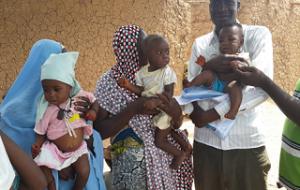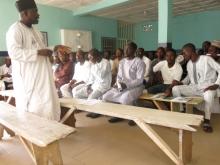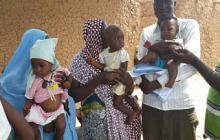Polio Legacy: WHO Partners Youth Groups to Dismantle Security Barriers in Accessing Chronically Missed Children.
Abuja, Nigeria, 12 November 2014 - Since the World Health Assembly at its sixty-fifth session of May 2012 declared Polio Eradication as a Public Health emergency of global significance, Nigeria continues to respond with equal degree of urgency to stop transmission by end 2014 through churning out streams of innovations / approaches to reach persistently missed children. The national polio eradication initiative oversight bodies in Nigeria have for some time requested for systematic engagement of the youth in the polio programme. WHO’s partnership with youth groups is proving to be an immeasurable boost to reaching chronically missed children.
Rationale for Partnership
In some communities, the reason for chronically missing children has been that some misguided youths, influenced by local anti-polio eradication groups and communities demanding provision of unmet felt needs, have instigated the youth to cause fear and panic on vaccination teams which had disrupted the teams from systematically reaching every settlement or household.
To set the stage for addressing the intractable problem, the WHO State Coordinator Dr. Audu Idowu explained that “the team unanimously settled to identify and systematically scale- up partnership with youth groups as part of WHO supported Demand Creation strategy being implemented in settlements with habitual non-compliance”.
Enabling Vaccination Team Performance
To augment efficiency of newly introduced Directly Observed Polio Vaccination (DOPV) strategy which targets immunization of eligible children outside the households, the support of the youth group is invaluable as success is largely dependent on a friendly ambience for vaccinators to freely vaccinate outside households in streets, playgrounds, markets, motor parks etc.
It therefore became imperative that the youth are well oriented on the importance of polio eradication campaigns, and fully engaged so that they can allow the vaccinators to vaccinate outside with confidence of their security.
The Director of Primary Health Care in Igabi Local Government Area (LGA) of Kaduna State, Hajiya Binta Mustapha, observed that “planning meetings organized by WHO and LGA teams with identified youth leaders during which the line list of non-compliance households reviewed and security settlements demarcated, prioritized and shared with respective leaders always precedes engagement”.
Impact and polio legacy
For better understanding of previous experiences Dr. Emmanuel Gali, a WHO National Surveillance Officer with the field support unit , revealed that “there is no state in which the youth’s aggression had generated more concern to vaccination teams and PEI than in Kaduna, particularly in Zaria, Igabi and Giwa LGAs”.
On what informed the paradigm shift, the coordinator of Rigasa PEI Youth forum, Alhaji Salisu Sani disclosed that “we made a detour from our previous posture because WHO personnel approached, sensitize and empowered the youth to be change agents in the society. Today, we are excited because we have increased protection for the vaccination team members, improve community awareness to vaccinate all eligible children at DOPV points, health camps, markets and motor parks”.
Since the engagement of the youth and free implementation of the DOPV strategy, there has been a significant reduction in the proportion of missed children in the 3 LGAs in Kaduna State. For instance, all the 3 LGAs, were estimated by lot quality assessment survey (LQAS) to have achieved polio SIAs coverage between 60-79% during the 2nd quarter of 2014 (April 2014 polio SIAs).
However, with the engagement of the youth in the 3rd quarter of 2014, polio SIAs coverage results have been accepted at 90% coverage in all 3 LGAs using LQAS. Explicitly, the September 2014 polio SIAs LQAS revealed that out of the 60 randomly selected children in each LGA, there were no missed children in Igabi and Zaria LGAs while only one child was missed in Giwa LGA.
It is safe to assert that, youth involvement has been a key catalyst in the full implementation of well-proven strategies to reach missed children such as DOPV which has resulted in the tremendous progress. During the last 2 rounds of polio SIAs, confidence has been reinforced and teams can now immunized children on the streets and special places without intimidation.
This partnership will be used as part of polio legacy to strengthen implementation and acceptance of other health interventions planned for the area as part of improving service delivery and strengthening health systems. Government and other partners have already shown interest to sustain this partnership for existing and future health programmes.





